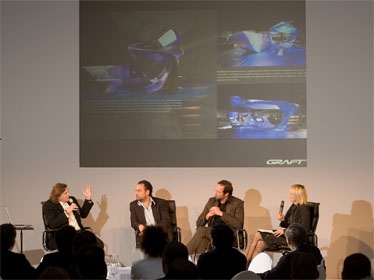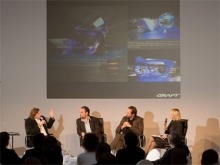
Graft architects discuss design work with Burns alumni on June 1

Graft architects discuss design work with Burns alumni on June 1
At the Berlin Burns Awards dinner on June 1, the architects of "Graft" have proven that they not only know how to deal with celebrity clients and stay in the media spotlight, but also how to eloquently answer questions about the nature of design work on both sides of the Atlantic and on the Eurasian continent. With offices in Berlin, Los Angeles and Beijing, the firm is able to compare the various economic, educational and creative resources among their clients on three continents. Since architecture is the most public and therefore most political of arts, choosing "Graft" proved to be a great pick for the dinner as it added a new dimension to transatlantic relations from the point of view of “creative Berlin.”
Despite a blizzard snow storm that kept some alumni and trustees away, approximately 80 guests enjoyed the fourth annual Burns dinner for American alumni on Feb. 14 at the Ritz-Carlton Battery Park in New York City. Javier Solana, E.U. High Representative and Secretary General for the Council of the European Union, flew in especially to address the Burns gathering, his second speech to the Burns alumni network. Solana discussed the importance of the media’s role during "a power shift from the West to new players," such as China, Brazil and India. The West's future, Solana argued, depends a lot on "how we treat these new players now during their way up." Solana also discussed "the dark side of globalization," which he thinks can be tackled by bringing together the "right actors for change," such as journalists, economists, politicians and NGOs. Rebuilding mutual trust among these players through compliance with agreements is the only way to tackle such conflicts as the West vs. Muslim countries, nuclear vs. non-nuclear, or energy-consumer vs. energy-supplier countries. Several Burns alumni were able to get Solana's feedback on questions about U.S.-E.U. negotiations with Iran on nuclear issues, the latest developments on independence for Kosovo, and the integration of Muslims in European countries.
The Burns Fellowship program is grateful to Goldman, Sachs & Co. and Deutsche Bank for sponsoring these annual alumni events.